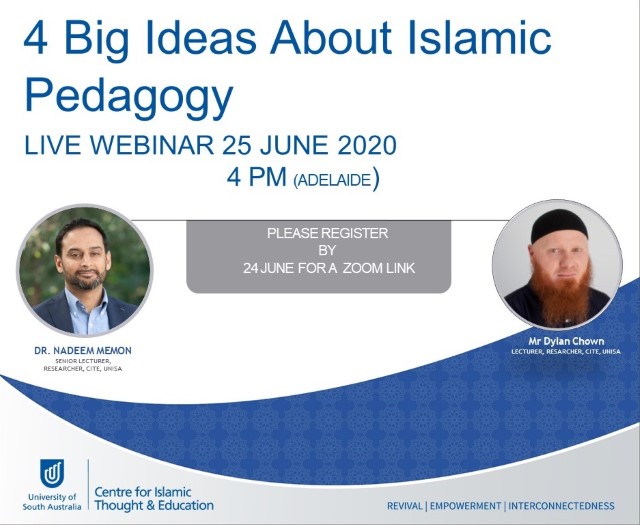Islamic Pedagogy refers to the educational values, concepts, and perspectives rooted in the Islamic tradition that inspire and inform renewed thinking within Islamic schools and educational settings.
Like other faith and spiritually based pedagogies, Islamic pedagogy challenges the increased technicising of teachers work and insists on centring educational values of holistic (mind-body-soul) education – where the education of the soul is paramount.
Pedagogy in this sense is a human science, a philosophy of education that addresses the big why questions around the purpose of education and schooling thereby informing the way we teach (i.e. instruction) - but isn’t simply the art of instruction. Pedagogy here refers to the education values that inform instructional practice. In other words, the way we teach is not arbitrary. We each teach in ways that reflect our educational values. And for educators in Islamic schools, the assumption is that educators (Muslim or not) reflect educational values of Islam.
Concrete examples of educational values and concepts in Islam that define an Islamic pedagogy include (but are not limited to):
- Fitrah (pure state) is the state all children are born in
- Amanah (trust) is the religious responsibility one holds as a parent or educator
- Tarbiya (to grow, increase, nurture wholeness) is an essential aim of education
- Ta’dib (refinement of character) is equally an aim of education
- Tazkiya (refining one’s spiritual self, self-discipline) is central to holistic education
- Niyyah (Intention) informs the purpose of learning
- Ilm / Aml (knowledge and action) is a critical interplay in learning
- Ihsan (excellence) defines how a learner approaches learning
- Muhasabah (self-assessment or introspection) defines the purpose of evaluation
- Tafakkur (reflection or purposive thinking) is a critical process in transformative learning
These concepts (and many, many others) are the basis of what make Islamic schools distinct. Islamic schools aren’t simply distinct because they are schools for Muslims, or because Islam as faith formation is taught in the school, or because the school environment reinforces Islamic values and religious observances. Islamic schools are distinct because they are rooted in a pedagogical tradition (in terms of education philosophy) that are informed by concepts like the ones listed above. For example, when an Islamic school claims in their mission and vision that their ultimate aim is to nurture tarbiya (wholeness – mind/body/spirit) then the educational approach of nurturing tarbiya is what distinguishes that school. And that educational approach of nurturing tarbiya will (or should) inevitability be based on other educational concepts rooted in Islam.
Faith-Based Pedagogies Reading Group
Our Faith-Based Pedagogies Reading Group sessions have been continuing.
The group is open and welcomes new members at any time to join online or in-person. To join or for more information, contact Nadeem Memon at Nadeem.memon@unisa.edu.au In the past few months two meetings were held.
Plese READ HERE on past meetings.
Call for Images of Practice in Islamic Schooling
When a picture paints a thousand words
To capture, celebrate and promote innovative practice across Australian Islamic schooling, the Centre for Islamic Thought & Education is calling for images of practice.
For further information and to submit images Click HERE.
More information
-
To clarify further, Islamic Pedagogy...
- Is NOT attempting to revive methods of instruction from past Muslim societies
- Is NOT about teaching Islam, Islamic Studies or integrating Islam across state curriculum
- Is NOT only for Muslim educators or Islamic Studies teachers
- Is NOT limited by sectarian or theological differences
- Is NOT going to look the same in every Islamic school setting
- Is NOT about standardising teaching and learning across a school
- Is about principled thinking and educational values rooted in Islam broadly
- Is flexible, adaptable, and fluid
- Is contextually relevant - sensitive and responsive to place and context
- Is informed by, and also contributes to, contemporary educational discourse and practice
- Is about educational renewal through in-service and pre-service teacher education
- Is for ALL educators in Islamic schools whose vision/mission aspires to nurture tarbiya (wholeness)
Islamic pedagogy then is an Islamic school’s educational philosophy of how to achieve the lofty mission and vision they have set out for themselves.
-
Why Islamic Pedagogy?
Islamic pedagogy as an educational philosophy is urgent and important because:
- Metalanguage: It provides a metalanguage – a philosophy of what makes an Islamic school distinct that has the potential to unite educators, school leaders, boards, and parents around what an Islamic school believes and why. This metalanguage provides the much-needed clarity that most schools require to ensure all key stakeholders are on the same page about how the articulated vision and mission is going to be achieved.
- Beyond Curriculum: It pushes boundaries on how school renewal will be achieved. For many schools the solution to Islamic schools has been better curriculum and better textbooks. Islamic pedagogy redirects the never-ending plight to get better curriculum and turns to a focus on aligning educational values first.
- Inspires Educators: Many committed educators in Islamic schooling question what makes Islamic schools distinct. Islamic schools are often criticised for being bland replications of public schools. Islamic pedagogy invests in our educators and fosters deeper sense of efficacy through continued professional learning, reflective practice, and dialogue that engages educators in connecting back to purpose and vision in relation to practice.
- Inspires School Leaders: It provides the basis for school leaders key role in leading learning. For school leaders in Islamic schools, Islamic pedagogy offers potential renewal and reinvigoration of their critical pedagogical leadership role, providing alternatives to the encroaching managerial leadership more aligned with economic/neoliberal aims.
-
Articulations about Islamic Pedagogy
- Nadeem on what is Islamic pedagogy - watch the video.
- Professor Mohamad: webinar April 29, 2020 – "Teachers Always Mattered"
-
Further reading and resources for Islamic Pedagogy
Below are a few published books that provide chapters relating to and expanding on Islamic pedagogy that are all readily available online:
Below is a resource on Islamic pedagogy that is also readily available online:
Innovative Islamic Schools Doing Islamic Pedagogy: Spotlight Series
A virtual tour of Next Generation School in Dubai, UAE.

A virtual tour of Al Fatih Academy, USA.

A virtual tour of Islamic Shakhsiyah Foundation, UK.
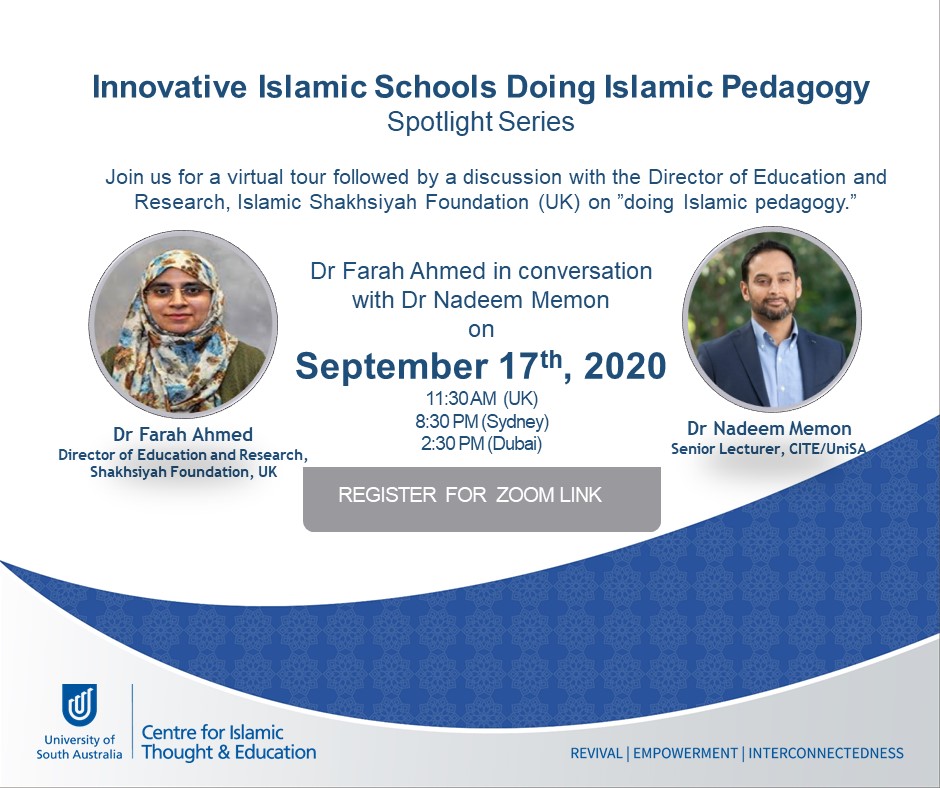
A virtual tour of Irfan College, Sydney, Australia.
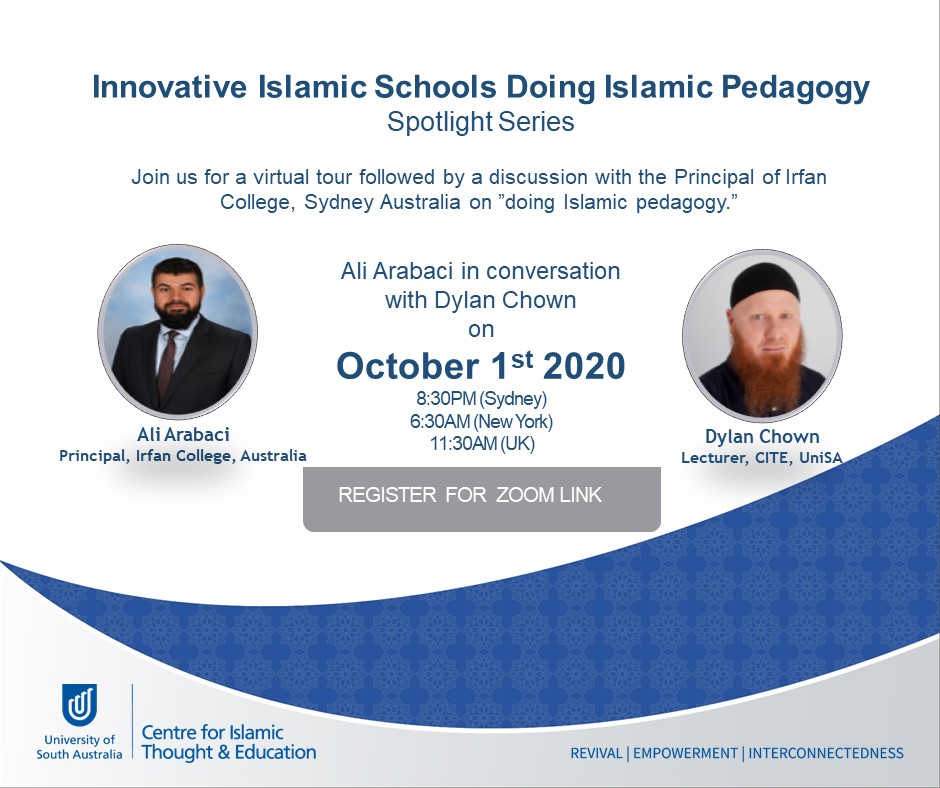
Islamic Pedagogy Focused Webinars
Why Islamic Schools Need Islamic Pedagogy
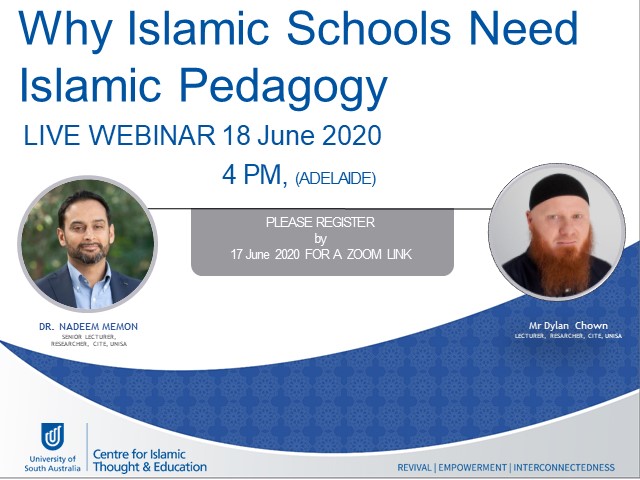
4 Big Ideas About Islamic Pedagogy
How Islamic Pedagogy Transformed My Classroom 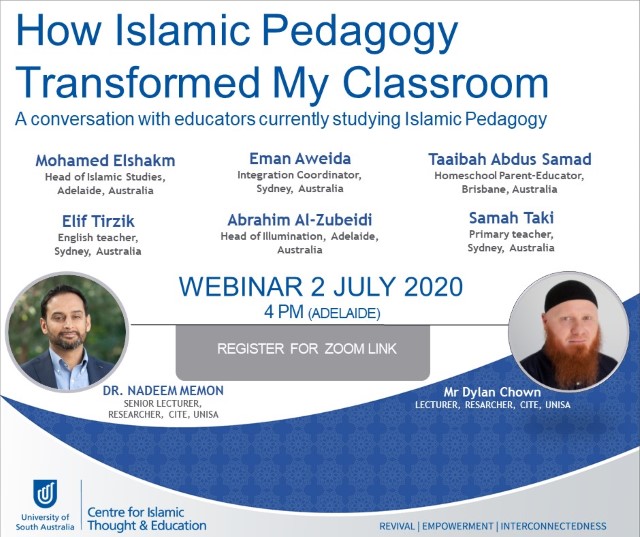
How Islamic Pedagogy is Transforming Our School





